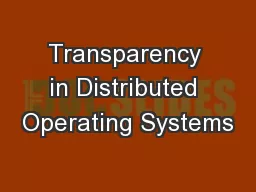PPT-“ Enhancing transparency and accountability in Elections.
Author : pamella-moone | Published Date : 2017-11-07
Opening Electoral Data An overview Transparency is a key principle for credible elections Process which is open to scrutiny by stakeholders I ndependent verification
Presentation Embed Code
Download Presentation
Download Presentation The PPT/PDF document "“ Enhancing transparency and accountab..." is the property of its rightful owner. Permission is granted to download and print the materials on this website for personal, non-commercial use only, and to display it on your personal computer provided you do not modify the materials and that you retain all copyright notices contained in the materials. By downloading content from our website, you accept the terms of this agreement.
“ Enhancing transparency and accountability in Elections.: Transcript
Download Rules Of Document
"“ Enhancing transparency and accountability in Elections."The content belongs to its owner. You may download and print it for personal use, without modification, and keep all copyright notices. By downloading, you agree to these terms.
Related Documents














